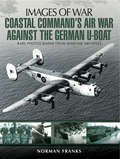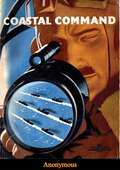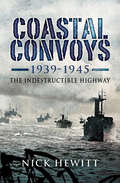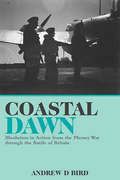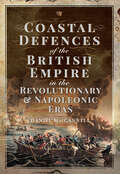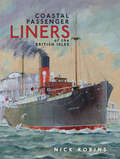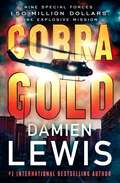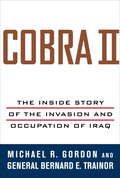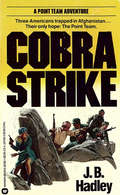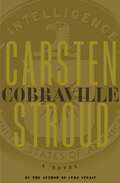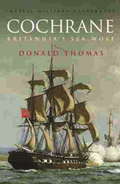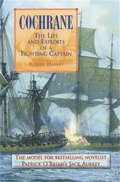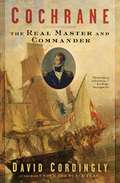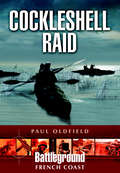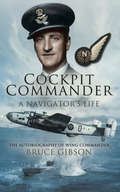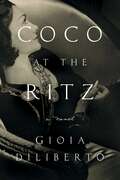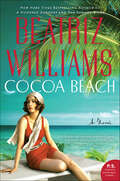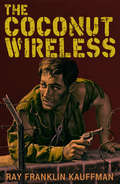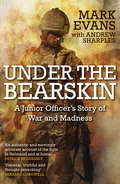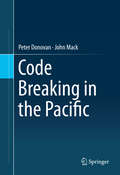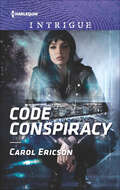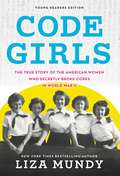- Table View
- List View
Coastal Command's Air War Against the German U-Boats: Rare Photographs From Wartime Archives (Images of War)
by Norman FranksThis book summarises the story of how RAF Coastal Command overcame the German U-boat danger during the Second World War and how the escalation of the U-boat war promoted the development of anti-submarine warfare, leading to victory over this menace in the Atlantic.At the start of the war, RAF Coastal Command had virtually no real chance of either finding or sinking Germany's submarines, but within a short period of time, new methods of detecting and delivering deadly ordnance with which to sink this underwater threat were dreamt up and implemented. It took the men of Coastal Command long hours patrolling over an often hostile sea, in all types of weather, but their diligence, perseverance and dedication won through, saving countless lives of both merchant and navy seamen out in the cold wastes of the Atlantic and contributing much to the final victory over Nazi Germany. This new addition to the Images of War series serves as a tribute to these men, recording their exploits in words and images.
Coastal Command: The Air Ministry Account Of The Part Played By Coastal Command In The Battle Of The Seas, 1939-1942
by AnonymousWritten by the Air Ministry and first published in 1942, this account provides a vivid description of the RAF Coastal Command operations during World War II.A must-read of intrinsic historical value and importance for all avid readers of British Military History.
Coastal Convoys 1939–1945: The Indestructible Highway
by Nick HewittUsing official records from the National Archives personal accounts from the Imperial War Museum and other sources, Coastal Convoys 1939 1945: The Indestructible Highway describes Britains dependence on coastal shipping and the introduction of the convoy system in coastal waters at the outset of the war. It beings to life the hazards of the German mining offensive of 1939, the desperate battles fought in coastal waters during 1940 and 1941, and the long struggle against German air and naval forces which lasted to the end of the Second World War. Reference is also made to the important role played by coasters during the Dunkirk evacuation in 1940 and the Normandy landings in 1944.
Coastal Dawn: Blenheims in Action from the Phoney War through the Battle of Britain
by Andrew D. BirdFrom the author of A Separate Little War, a detailed history of the British World War II aircraft and their brave crew. In 1940, the defense of Great Britain rested with a handful of volunteer aircrew, Churchill&’s &“few.&” Overshadowed in later folklore by the more famous Spitfire and Hurricane pilots, there were other pilots, observers and air gunners—just as courageous—flying the Bristol Blenheim MKIV-F. The future of the country and arguably that of the free world depended also on their skill, morale, and sacrifice. Remarkably little has been chronicled of these men and their aircraft—the &“Trade Protection&” squadrons formed by Hugh Dowding—allotted to 11 Group in October, 1939. The aircraft&’s range and endurance made it suitable for defense of coastal shipping against attack on the southern and eastern shores of Britain, and for operations further afield. Indeed, during bitter fighting casualties among Numbers 235, 236, 248, and 254 Squadron Blenheims were high on operations over Norway, Holland, France, Dunkirk, and then the Battle of Britain where the Blenheims were completely outclassed by Messerschmitt 109 and 110 fighters, and fell easy victims, scythed from the sky. But the record of the aircraft and their crew was an immensely proud one. Drawing on contemporary diaries, periodicals, letters, logbooks, memoirs, and interviews with survivors, lauded historian Andy Bird reassesses the vital role they played and repositions it in history. In doing so, he justifiably embraces the heroes we have left behind.
Coastal Defences of the British Empire in the Revolutionary & Napoleonic Eras
by Daniel S. MacCannellFar more than an architecture book, Coastal Defences of the British Empire, 1775–1815 is a sweeping reinterpretation of the Martello towers, Grand Redoubts, Royal Military Canal and other new defence infrastructure of the Napoleonic War. Lavishly illustrated with period maps, views, portraits, cartoons and newly commissioned color photographs, it includes not only these structures’ forerunners, and plans that were never executed, but also the grand strategy that informed them. At its best, this saw Britain’s position as a vast land battle, with the deadly threat of the French-held Antwerp navy yards on its own ‘left wing’, and Lisbon as the enemy’s ‘weak left’ to be ‘turned’. The book also takes in the astonishingly inventive, bold and bloody small-boat wars that raged from the Baltic and Channel coast to Chesapeake Bay and Lake Ontario, and provides vivid pen-sketches of the now-obscure and sometimes deeply flawed strategic visionaries, engineers, inventors, and fighting men who held the line as – even after Trafalgar – the forces of an ever more powerful French empire circled like sharks. Along the way, it traces a fundamental change in the nature of war and society: from a ponderous game of fortresses and colonies played by rulers, to murderous ‘foot by foot’ defence of the whole territory of the nation by ‘both sexes and every social type’.
Coastal Passenger Liners of the British Isles
by Nick RobinsAt the beginning of the last century it was possible to sail from London to Glasgow via the south coast ports and Belfast, returning along the east coast from either Dundee or Leith for as little as five pounds. Those were the days when 300 passengers were landed twice weekly at Grangemouth or Dundee from the London boat, and the coastal passenger and cargo liner was in its heyday, catering both for the first class tourist as well as offering keenly priced second class fares for the like of football fans following away matches. Sadly, these wonderful steamer services are now largely forgotten but this new book will stir fond memories of the ships and their coastal voyages. The Depression of the 1930s, coupled with competition from both railway and the motor coach, were to spell the end for many of the coastal liners, while heavy losses incurred in World War II left only a few ships each offering just a handful of passenger berths. The story of their one hundred years of service is accompanied by numerous fascinating anecdotes, and the book focuses as much on the social need for coastal passenger services, the men and women who provided the services and the passengers who used them, as it does on the nuts and bolts of the ships themselves. This beautifully presented book will delight both ship enthusiasts and all those who enjoy the maritime and social history of the British Isles.
Cobra Bargain
by Timothy ZahnIn this Cobra novel, a woman is allowed to have the surgery to turn her into a cobra. It is not because folks want this. There is a problem on a world whose language she knows and it will be hard for a male Cobra to infiltrate this insular patriarcal society without arousing suspicion. And, as soon as the mission starts, disasters begin to happen.
Cobra Gold
by Damien LewisA rogue band of SAS commandos rob a bank in war-torn Beirut—and return decades later to find the gold—in this military thriller based on a true story.Beirut, 1976. As war ravages the country, an unknown band of armed men blast their way into the Imperial Bank of Beirut. Over the next forty-eight hours, they load three trucks with gold bullion and then disappear without a trace. Two weeks earlier, a new SAS Major had tasked his men with planning such a Beirut bank robbery—strictly as an exercise. But when veteran Luke Kilbride has his heist plan rejected as &“useless,&” he decides to prove the Major wrong by pulling the job off for real. The heist goes perfectly . . . until it doesn&’t. Kilbride and his men are forced to hide the loot and make their getaway. Thirty years later, Kilbride and his team are planning their return. The only problem is that a powerful enemy is hell-bent on finding the gold before they do. Kilbride dreams up an audacious mission, and the race is on to reach the gold before the ruthless Black Assassins can catch up with them.
Cobra II
by Michael R. Gordon Bernard E. TrainorWritten by the chief military correspondent of the New York Times and a prominent retired Marine general, this is the definitive account of the invasion of Iraq.A stunning work of investigative journalism, Cobra II describes in riveting detail how the American rush to Baghdad provided the opportunity for the virulent insurgency that followed. As Gordon and Trainor show, the brutal aftermath was not inevitable and was a surprise to the generals on both sides. Based on access to unseen documents and exclusive interviews with the men and women at the heart of the war, Cobra II provides firsthand accounts of the fighting on the ground and the high-level planning behind the scenes. Now with a new afterword that addresses what transpired after the fateful events of the summer of 2003, this is a peerless re-creation and analysis of the central event of our times.From the Trade Paperback edition.
Cobra Strike (The Point Team #3)
by J. B. HadleyAnother novel of mercenaries in Vietnam after the war ends.
Cobraville: A Novel
by Carsten StroudA prophetic thriller from the author of Cuba Strait, Cobraville follows a covert CIA mission deep in the jungles of the Philippines during a savage civil war. Cole Langan's five-man unit -- in country to repair what they have been led to believe is a vital NSA surveillance monitor -- instead finds itself caught up in a spiraling vortex of lies, spies, and traitors. When the unit collides -- disastrously -- with UN peacekeepers, the surviving CIA agents may face war-crimes trial at the International Criminal Court. On the other side of the Earth, Cole's father, Senator Drew Langan, tries desperately to identify a shadowy group behind the betrayal of his son's CIA unit. An elusive German businessman leads Drew and his femme fatale bodyguard down a rabbit hole of intrigue and corruption that leads all the way to the highest levels of the United Nations. Shot through with Stroud's grimly mordant sense of humor and painstakingly researched, Cobraville cuts deep into the harrowing reality of America's secret wars, in a cautionary book that ought to be read by every spymaster in D.C. and every apparatchik at the UN.
Cochrane
by Donald ThomasBestselling account of the life of a real Horatio HornblowerThe life of Thomas, Lord Cochrane, later 10th Earl of Dundonald, was more extraordinary than that of Nelson, more far fetched than that of Hornblower or Patrick O'Brien's Jack Aubrey. Born the son of an eccentric and indigent Scottish peer, he entered the Royal Navy in 1793. In a series of outstanding and heroic actions, often against seemingly overwhelming odds, he made his name fighting Napoleon's navy as one of the most dashing and daring frigate captains of his day, before embarking on a career as a mercenary admiral.
Cochrane: Britannia's Sea Wolf (Sven Hassel War Classics)
by Donald ThomasBestselling account of the life of a real Horatio HornblowerThe life of Thomas, Lord Cochrane, later 10th Earl of Dundonald, was more extraordinary than that of Nelson, more far fetched than that of Hornblower or Patrick O'Brien's Jack Aubrey. Born the son of an eccentric and indigent Scottish peer, he entered the Royal Navy in 1793. In a series of outstanding and heroic actions, often against seemingly overwhelming odds, he made his name fighting Napoleon's navy as one of the most dashing and daring frigate captains of his day, before embarking on a career as a mercenary admiral.
Cochrane: The Fighting Captain
by Robert HarveyThe adventures of the daring Thomas Cochrane, called 'the sea wolf' by Napoleon, are so extraordinary that his life reads like a page-turning work of fiction. In one sense it became so, for the novelist Patrick O'Brian by his own admission used Cochrane as the basis for Jack Aubrey, hero of his much-loved series of naval novels.Cochrane became a household name when in 1800 he took command of the tiny brig, the Speedy, and created mayhem in the Mediterranean earning himself and his crew a fortune in prize money. A wildly contradictory character, never less than heroic, and this lively new account of his life has sold over 7,000 copies in hardback.
Cochrane: The Fighting Captain
by Robert HarveyThe adventures of the daring Thomas Cochrane, called 'the sea wolf' by Napoleon, are so extraordinary that his life reads like a page-turning work of fiction. In one sense it became so, for the novelist Patrick O'Brian by his own admission used Cochrane as the basis for Jack Aubrey, hero of his much-loved series of naval novels.Cochrane became a household name when in 1800 he took command of the tiny brig, the Speedy, and created mayhem in the Mediterranean earning himself and his crew a fortune in prize money. A wildly contradictory character, never less than heroic, and this lively new account of his life has sold over 7,000 copies in hardback.
Cochrane: The Real Master And Commander
by David CordinglyFrom the bestselling author of "Under the Black Flag" comes the definitive biography of Thomas Cochrane, the swashbuckling nineteenth-century maritime hero who "packed [in] enough drama and history to shame both Horatio Nelson and Sir Francis Drake" (Ken Rignle, Washington Post). In this fascinating account of Thomas Cochrane's extraordinary life, David Cordingly ("Under the Black Flag" and "The Billy Ruffian") unearths startling new details about the real-life "Master and Commander"--from his heroic battles against the French navy to his role in the liberation of Chile, Peru, and Brazil, and the stock exchange scandal that forced him out of England and almost ended his naval career. Drawing on previously unpublished papers, his own travels, wide reading, and original research, Cordingly tells the rip-roaring story of the archetypal Romantic hero who conquered the seas and, in the process, defined his era.
Cockleshell Raid (Battleground French Coast)
by Paul OldfieldOperation Frankton is a story of how a handful of determined and resourceful men, using flimsy canoes, achieved what thousands could not by conventional means. The volunteers had enlisted for Hostilities Only and, except for their leader, none had been in a canoe before. However, with a few months training they carried out what one German officer described as, the outstanding commando raid of the war. They became known as the Cockleshell Heroes, having been immortalized in a film and a book of that name in the 1950s. This book covers the whole of the Frankton story including the development of the Royal Marines Boom Patrol Detachment, the planning and preparation for the raid, its aftermath and an account of the horrific war crimes inflicted on those who were captured. It also includes the epic escape by Haslar and Corporal Bill Sparks across occupied France into Spain.
Cockpit Commander: The Autobiography of Wing Commander Bruce Gibson
by Bruce GibsonPreviously self-published by the author, this book charts the course of a dramatic career as a Wing Commander. Living through one of the most dynamic periods in military and Aviation development history, Bruce Gibson saw events play out from his elevated aerial position. His fascinating story will appeal to a wide audience, focussing as it does not only upon Aviation concerns. From life as a mischievous child living in the East End of London, to realising his true direction and joining the RAF Air Volunteer Reserves in 1937, and then the Royal Air Force, and beyond into Aviation ventures in a Civilian capacity. His amusing observations and anecdotes provide the most colourful insight into life during the monochromatic blackout years of World War II, and beyond.Many historical records and operational logs are available on the market to those looking for cold facts and statistical analyses of events; this account features the human tales, the anecdotes and spirit of camaraderie which characterised Gibson's experiences.
Coco at the Ritz: A Novel
by Gioia DilibertoA riveting and prismatic novel of the eternally enigmatic Coco Chanel in the aftermath of World War II.Though her name is synonymous with elegance and chic, the iconic Coco Chanel had a complicated dark side, and in late August 1944, as World War II drew to a close, she was arrested and interrogated on charges of treason to France. Many of the facts are lost to history, partly through Chanel's own obfuscation, but this much is known: the charges grew out of her war-time romance with a German spy, and one morning two soldiers from the French Forces of the Interior—the loose band of Resistance fighters, soldiers and private citizens who took up arms in the wake of the Liberation of Paris—led Chanel from her suite at the Ritz Hotel in Paris to an undisclosed location for questioning. What transpired during her interrogation, who was present, and why she was set free when so many other women who&’d been involved with German men (willingly or otherwise) had their heads shaved or were imprisoned, remains a mystery. In this brilliantly insightful and compulsively readable novel from the author of I am Madame X, Gioia Diliberto explores the motivations of this complex woman and portrays the gripping battle of wits that could have been her interrogation. Was Chanel truly a collaborator? Though the Occupation of France offered a stark contrast between good and evil, few people are wholly heroes or villains in wartime. Most citizens, as the writer André Gide noted, were like old shoes floating in murky waters: battered and torn, riding the turbulent flow, just trying to survive. By turns raw and vulnerable, steely and flawed, Chanel emerges from these pages as a woman who owns her decisions, no matter the consequences. Rich with history and filled with emotional truths, Coco at the Ritz is a story about the choices one woman made when the stakes were the highest. In today&’s world, it is a cautionary tale about the necessity of standing against evil when it stares you in the face.
Cocoa Beach: A Novel
by Beatriz WilliamsThe New York Times bestselling author of A Certain Age transports readers to sunny Florida in this lush and enthralling historical novel—an enchanting blend of love, suspense, betrayal, and redemption set among the rumrunners and scoundrels of Prohibition-era Cocoa Beach.Burdened by a dark family secret, Virginia Fortescue flees her oppressive home in New York City for the battlefields of World War I France. While an ambulance driver for the Red Cross, she meets a charismatic British army surgeon whose persistent charm opens her heart to the possibility of love. As the war rages, Virginia falls into a passionate affair with the dashing Captain Simon Fitzwilliam, only to discover that his past has its own dark secrets—secrets that will damage their eventual marriage and propel her back across the Atlantic to the sister and father she left behind.Five years later, in the early days of Prohibition, the newly widowed Virginia Fitzwilliam arrives in the tropical boomtown of Cocoa Beach, Florida, to settle her husband’s estate. Despite the evidence, Virginia does not believe Simon perished in the fire that destroyed the seaside home he built for her and their young daughter. Separated from her husband since the early days of their marriage, the headstrong Virginia plans to uncover the truth, for the sake of the daughter Simon never met.Simon’s brother and sister welcome her with open arms and introduce her to a dazzling new world of citrus groves, white beaches, bootleggers, and Prohibition agents. But Virginia senses a predatory presence lurking beneath the irresistible, hedonistic surface of this coastal oasis. The more she learns about Simon and his mysterious business interests, the more she fears that the dangers that surrounded Simon now threaten her and their daughter’s life as well.
Coconut Wireless
by Ray F. KauffmanCoconut Wireless, first published in 1948, is a World War II novel set in the Far East. The book follows an American, Graydon, in his counter-espionage efforts against the occupying Japanese forces. Featuring many authentic details of the region and exciting action scenes as the hero infiltrates enemy territory, completes his missions and eludes capture, the book is based, in part, on author Ray Kauffman’s own experiences with the Office of Strategic Services (OSS) in Ceylon (Sri Lanka) during the war. The book’s title refers to the quick movement of news and gossip in the tropics. Kauffman is also the author of Hurricane’s Wake, an account of a round-the-world voyage in a 45-foot sailboat.
Code Black: A junior officer's story of war and madness
by Mark Evans Andrew SharplesTrapped in an isolated outpost on the edge of the Helmand desert, a small force of British and Afghan soldiers is holding out against hundreds of Taliban fighters. Captain Mark Evans, a junior British officer, has been sent to take command of the Afghan troops. Under brutal siege conditions, running low on food and ammunition, he experiences the full horror of combat. As the casualties begin to mount and the enemy closes in, Evans finds both his leadership and his belief in the war severely tested. Returning home, he is haunted by the memories of Afghanistan. He can't move on and his life begins to spin out of control. Code Black tells a compelling story of survival against the odds and the scars war leaves behind.
Code Breaking in the Pacific
by Peter Donovan John MackThis book reveals the historical context and the evolution of the technically complex Allied Signals Intelligence (Sigint) activity against Japan from 1920 to 1945. It traces the all-important genesis and development of the cryptanalytic techniques used to break the main Japanese Navy code (JN-25) and the Japanese Army's Water Transport Code during WWII. This is the first book to describe, explain and analyze the code breaking techniques developed and used to provide this intelligence, thus closing the sole remaining gap in the published accounts of the Pacific War. The authors also explore the organization of cryptographic teams and issues of security, censorship, and leaks. Correcting gaps in previous research, this book illustrates how Sigint remained crucial to Allied planning throughout the war. It helped direct the advance to the Philippines from New Guinea, the sea battles and the submarine onslaught on merchant shipping. Written by well-known authorities on the history of cryptography and mathematics, Code Breaking in the Pacific is designed for cryptologists, mathematicians and researchers working in communications security. Advanced-level students interested in cryptology, the history of the Pacific War, mathematics or the history of computing will also find this book a valuable resource.
Code Conspiracy (Red, White and Built: Delta Force Deliverance #3)
by Carol EricsonTop find his missing commander, a Delta Force agent must rely on the one woman he swore to never trust again in this military romantic thriller.Hacker Jerrica West has never been one to follow the rules. So she’s shocked to learn that her by-the-book ex-boyfriend wants her help to locate his missing Delta Force leader. Gray Prescott is a hard man to refuse, but this assignment is more dangerous than either of them could have guessed. When the cybertrail exposes a terrorist plot, Jerrica must put her faith in the man she might be forced to walk away from all over again . . .
Code Girls: The True Story of the American Women Who Secretly Broke Codes in World War II (Young Readers Edition)
by Liza MundyIn the tradition of Hidden Figures and The Girls of Atomic City, Code Girls is the amazing true story of the young American women who cracked German and Japanese military codes during World War II.More than ten thousand women served as codebreakers during World War II, recruited by the U.S. Army and Navy. While their brothers and boyfriends took up arms, these women moved to the nation's capital to learn the top secret art of code breaking. Through their work, the "code girls" helped save countless lives and were vital in ending the war. But due to the top secret nature of their accomplishments, these women have never been able to talk about their story--until now. Through dazzling research and countless interviews with the surviving code girls, Liza Mundy brings their story to life with zeal, grace, and passion. Abridged and adapted for a middle grade audience, Code Girls brings this important story to young readers for the first time, showcasing this vital story of American courage, service, and scientific accomplishment.
